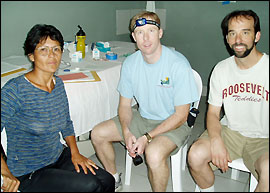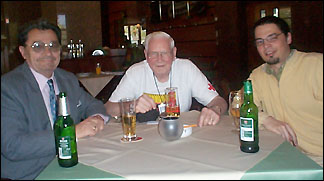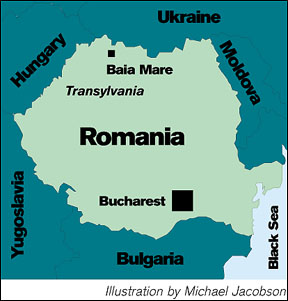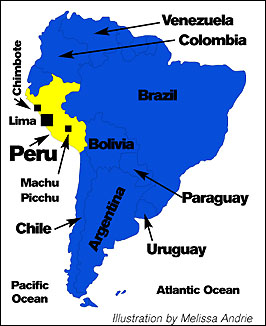Local men volunteer eye care abroad
 The extent of her vision problem - along with the fact that most of the other patients treated by Greg Friederichs and his team had vison tending the opposite direction - meant that no one else needed the same prescription that she did. She was lucky enough to receive three pairs of glasses, Friederichs said.
The extent of her vision problem - along with the fact that most of the other patients treated by Greg Friederichs and his team had vison tending the opposite direction - meant that no one else needed the same prescription that she did. She was lucky enough to receive three pairs of glasses, Friederichs said.
Greg Friederichs - shown here at center - used familiar medical instruments in an unfamiliar place as the optometrist spent two weeks in Chimbote, Peru, with Volunteer Optometric Services for Humanity.
This woman, and thousands more, are grateful to volunteers like Friederichs and Don Torbenson, both of Paynesville, who traveled abroad this spring to give them access to eye care.
However, these two volunteers say they are more indebted to those they met through their Volunteer Optometric Services for Humanity (VOSH) missions than anyone is indebted to them. Friederichs was out of the country from April 1-13 on his trip to Chimbote, Peru, while Torbenson was gone to Baia Mare, Romania, April 29-May 13.
While abroad, each worked with a team of optometrists and assistants to offer eye care. Torbenson's large team of 50 was led by Dr. Jim Hess - a 1971 PHS grad and the president of Minnesota VOSH - and included 14 optometry students from a Canadian university. Friederichs - an optometrist who helped lead his trip, though it was his first with VOSH - was one of 13 members on his team.
 Despite the different destinations and sizes of the teams, they provided similar services to those of all VOSH teams, all of which were offered free of charge.
Despite the different destinations and sizes of the teams, they provided similar services to those of all VOSH teams, all of which were offered free of charge.
Don Torbenson (center), a former educator, visited with a Romania teacher (left) as the man's son interpreted. During a service trip to Romania, Torbenson fit the man with a pair of donated glasses before visiting with him at a hotel.
Both groups had brought thousands of pairs of glasses in a wide range of strengths, and after a patient's eyesight was tested by an optometrist, assistants would find the pair of glasses which matched the prescription best.
Torbenson's task in Romania was to make these selections, while Friederichs performed examinations in Peru.
All glasses given out were used and had been sorted and cleaned by volunteers such as those at the Paynesville Area Center, who help supply these trips by processing approximately 10,000 pairs of donated glasses each year.
 The majority of patients seen by the teams received a pair of glasses, and surgery, especially cataract surgery, was performed on some.
The majority of patients seen by the teams received a pair of glasses, and surgery, especially cataract surgery, was performed on some.
Prior to the surgeries, some of the patients could not see a hand waved in front of their faces.
Friederichs's team helped about 1,350 people, fewer than they had hoped, because an automated piece of equipment used to test vision was confiscated at Peruvian customs .
Though the team was not aware of it at the time, he said, they later discovered that the customs officer was likely looking for a large bribe. This possibility had not occurred to Friederichs, who was on his first trip, and the cultural difference surprised him, he said.
Without the device, which was returned to them when they left the country, the team used handheld equipment to perform the tests in Chimbote, which was slower but offered its own advantage. Since additional time was necessary with each patient, the volunteers interacted with the people of Peru.
Two team members had degrees in Spanish, and they, along with some local citizens who spoke English well, translated for the rest of the team.
Hospitality was a priority for those he helped, and Friederichs said this was obvious in how they treated him during his two-week trip in early April. He added that despite their own need, living in a city where 75 percent are unemployed, "the people were happy, friendly, and clean."
One family invited the team members for dinner and hired a folk band from the Andes Mountains for entertainment. When some volunteers prepared to leave, the host pushed a couch in front of the door and politely told them to stay and dance.
 Though Torbenson was not able to spend as much time with each of his patients in Baia Mare, his team was able to serve nearly 5,000 of the Romanian poor, including orphan children, and he considers this trip the most successful of the four he has taken with VOSH. His other missions were to Guatemala, Ecuador, and Costa Rica.
Though Torbenson was not able to spend as much time with each of his patients in Baia Mare, his team was able to serve nearly 5,000 of the Romanian poor, including orphan children, and he considers this trip the most successful of the four he has taken with VOSH. His other missions were to Guatemala, Ecuador, and Costa Rica.
Romania, where most families have primitive, self-sustaining farms with large gardens, is a place where horses still pull plows, and while on his two-week trip in May, Torbenson even saw a team of oxen working.
It first seemed to be a "backward country," but the people of this heavily populated land were very gracious to the entire team, he said.
While fitting an elderly gentleman with glasses, he discovered through an interpreter that the man was a teacher, which interested him as a former teacher, principal, and superintendent.
The man was able to visit Torbenson at the team's hotel, and they spoke about the Romanian culture and the changes that came with the communist revolution.
Traveling many miles on Romania's rough, narrow, winding roads - it was 350 miles from the airport to Baia Mare - was the only negative part of the trip, but it did give the team a chance to view the "beautiful Transylvanian countryside," according to Torbenson.
After five days working eight to ten hours per day, his team spent four days sightseeing in Romania, including a trip to Bran Castle, which was Dracula's lodging, according to legend.
Much of the team then traveled to Athens, Greece, to see the Acropolis and Parthenon and to tour the city for four additional days before returning home.
Friederichs explored part of Peru with his team, leaving the barren area around Chimbote, where it has not rained for seven years, to travel up in the mountains, where the countryside is lush. They visited Machu Picchu, a historic site of Incan ruins, and spent time in Lima, the country's current capital.
It was fun to visit these well-known sites, but the highlight of both their trips was meeting patients, learning about the different cultures, and offering eye care in return, the two agreed. Friederichs, who had other family members on the trip, also enjoyed working with them and hopes to take more VOSH trips with those he knows, including his sons.
The assistance was gladly welcomed and appreciated by the communities the two local men worked in. Friederichs discovered how true this was when a woman told him she had been waiting in line for three days outside the church compound they worked from, despite danger from local gangs. The Romanian needy also waited patiently to receive assistance from Torbenson's team. Helping people so eager and grateful for what they had to offer was very rewarding, they agreed.
Contact the author at editor@paynesvillepress.com • Return to News Menu
Home | Marketplace | Community